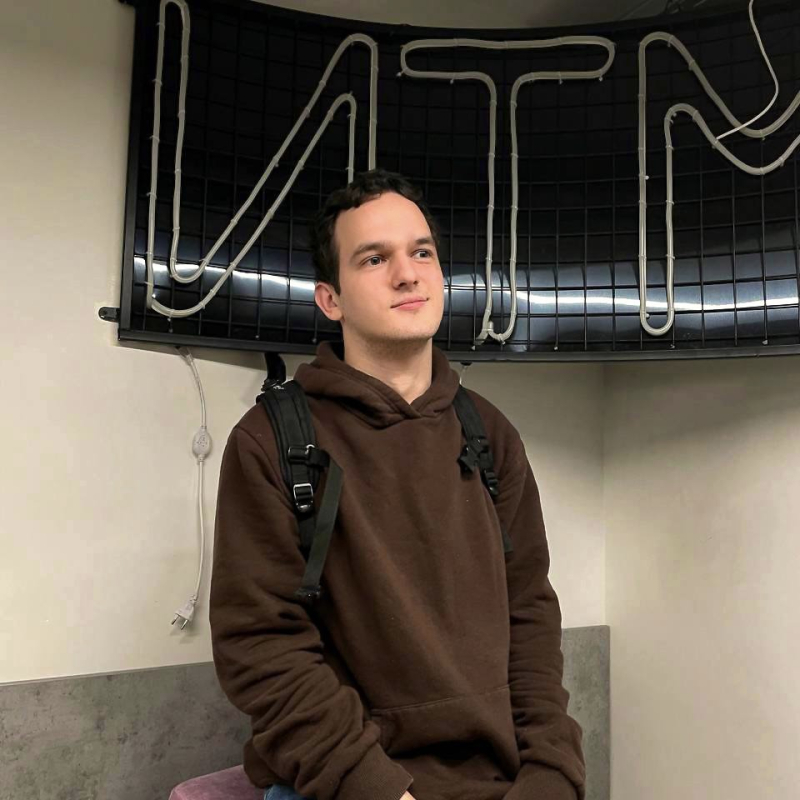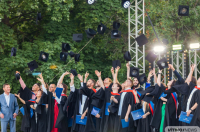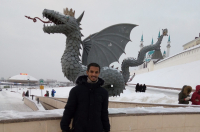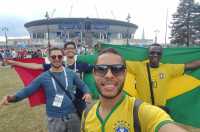Tell us about yourself.
My name is Vladimir Kartashev and I come from Bishkek, the capital of Kyrgyzstan. I am a Bachelor's student at the Faculty of Software Engineering and Computer Systems, so I study programming, namely the Java programming language and various adjacent technologies and frameworks.
Was it hard to get into ITMO?
I had known that I wanted to study at ITMO since ninth grade. It became a priority for me because of its place in the rankings. My school organized special events where we could meet representatives of different universities. I went to one such online meeting held by people from ITMO – there, I learned about the Congress of Young Scientists, a contest that gives you a chance to enter ITMO without exams. I found a collaborator at my school and together we developed an Android app for the visually impaired, which helped us win the Congress of Young Scientists that year (you can read more about the app here).
After that, I decided to explore the available scholarships. I learned about the Rossotrudnichestvo initiative. You need to choose a specialization and up to six universities you want to apply to. Then, you take an exam in the core subject of your specialization. You can also upload your relevant achievements to your personal page on Rossotrudnichestvo.
Why did you decide to study this field?
I chose my specialization after consulting with my father, who is an experienced programmer. We looked through different faculties and universities and settled on my faculty because here the curriculum offers a solid introduction to professional programming: from software development to different technologies and even hardware. I am actually now hoping to get the chance to transfer to another faculty at ITMO because I’ve realized I am not that into low-level programming (i.e. working with hardware). I’ve learned that it’s an easy process at ITMO, but I need to make sure I can transfer and keep my scholarship.
What do you do apart from your studies?
I develop my projects and take part in almost any student competition I hear about. For instance, this year I also participated in the Congress of Young Scientists – sadly, not as successfully as the first time. Moreover, I took part in ICPC, the first selection round, but we didn’t pass any further in the tournament.
One of the projects I am a part of is ITMO Memory, where I am supervised by Galina Zhirkova, the head of ITMO’s Center of Social Sciences and Humanities. We are working on an app about the history of the Smolny Institute of Noble Maidens.
As for my projects, I am now learning C++ to make a Perlin noise-based algorithm for pseudorandom number generation more accessible and user-friendly. My main motivation behind these projects is to assemble a strong portfolio that will help me land a job in my second year of studies.
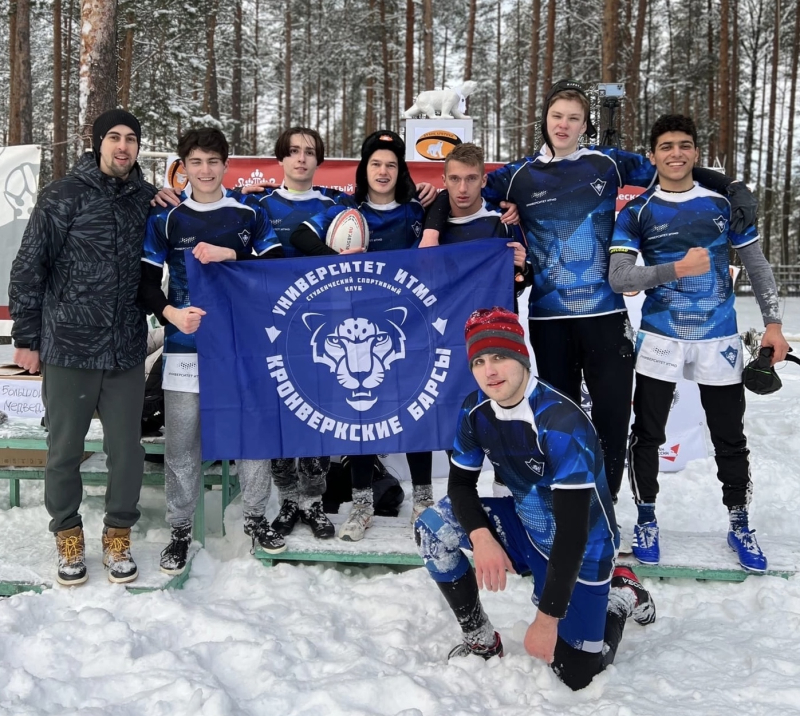
Vladimir Kartashev (center) with his sports team. Photo courtesy of the subject
Are you part of any student clubs?
I tried to sign up for some of the clubs I was interested in, but unfortunately I didn’t get any replies. At this time, I am more interested in research and project activities.
What are your impressions of St. Petersburg? Did you have any expectations – and were they met?
I think I expected a bit more from the city. Although, when I first came here, I was overwhelmed by what I saw: the architecture in the city center is very aesthetically pleasing. I also enjoyed the walk from the Lomonosova campus to my dormitory located on Vyazemsky Lane, but then the further I went from the city center, the less impressed I was by the streets and courtyards. So I’d say it’s a city of stark contrasts – you see beautiful buildings on one street and some less cared-for on another.
But I really enjoyed going to the outskirts of the city. For some reason, I really like the urban aesthetics of the concrete jungle unveiling there. I am also really impressed by the commemorative plaques on buildings here. I am always inspired by thinking that I am walking the same streets as great minds from the past – it gives you the feeling of connection to history.
Do you have any favorite places in the city that you’d recommend visiting?
If you wish to explore the city, I’d say you have to put on a pair of headphones, turn on your favorite music, and walk all over the city center. That’s how I personally enjoy spending time here and how I get the feeling of my surroundings.
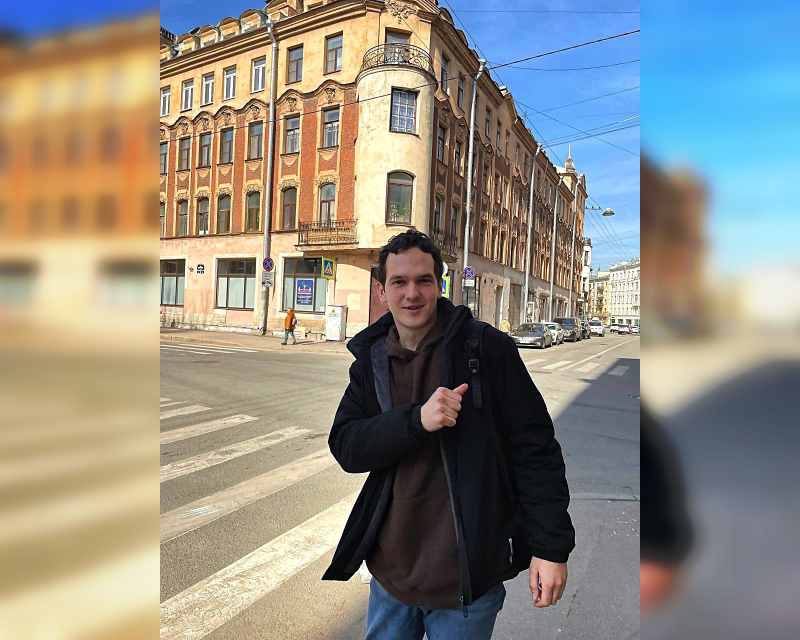
Vladimir really enjoys his walks in the city. Photo courtesy of the subject
What are your plans after graduation?
I am planning to get a job, preferably at a major company, such as Yandex. And my dream is to start my own software development company – that’s why I am constantly working on my own projects and developing apps that I am planning to make available on online marketplaces.
What do you like the most about being a student? And what do you like the least?
To be honest, I love studying most of all. I think the most important thing is to follow your favorite study routine. For instance, I love studying at night, from 1 am till morning. My faculty is one of the top ones in this field, so I really need to give it my all to keep up with all the classes.
As for the least, I’d say the lack of time. There’s so much to study and so little time. I would love to have the chance to study at a slower pace and set aside enough time for every subject.
You’ve mentioned you live in a dormitory on Vyazemsky Lane. Do you like it there?
I live in a corridor-type dormitory, which is generally considered less preferable than the module-type one, but I wouldn’t trade it for anything. I like how I can truly be a part of a community here – if I have any problems, I can reach out to my classmates and they can do the same; there is always someone to talk to and everyone is friendly – both the staff and the students.
There is one important thing to keep in mind: you might get a room that you don’t like (because it’s too messy and cluttered, for instance) and in that case you should apply for another room. It is usually possible to switch rooms after the start of the academic year.
Is there a piece of advice you’d like to give to other international applicants?
If you have friends who want to study abroad, tell them about the Rossotrudnichestvo initiative – not many people know about it, so they will have a great chance to get into a Russian university and get a scholarship. Also, you should definitely read everything you can about your program and specialization to make sure you understand what it is you are going to be studying and if it fits with your image of who you want to be in your professional life. Look online or ask around for reviews of your faculty or program before making the final decision.
Importantly, you have to learn to be responsible for yourself. Remember that you are now the one who can solve your problems. I always try to be responsible and have a positive attitude – it does wonders!
